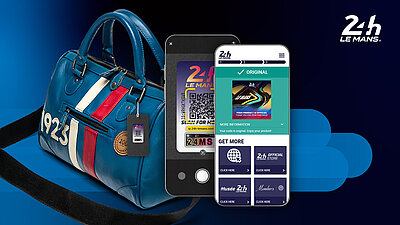The Problem with Counterfeit Infant Nutrition and What Brands Can Do About It
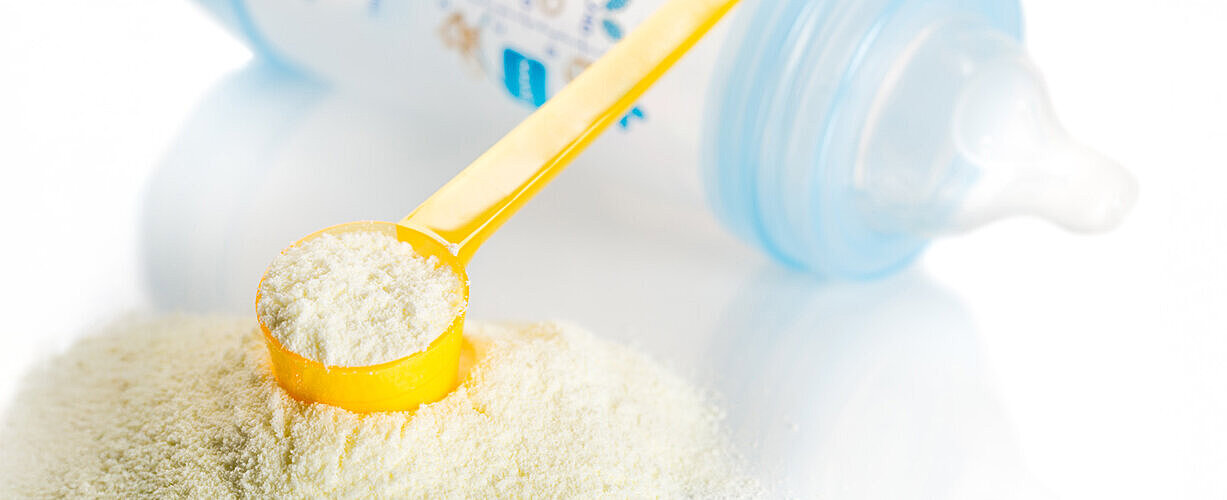
A booming market facing growing risks
The global infant nutrition market was valued at USD 54.54 billion in 2024 and is projected to surpass USD 143.27 billion by 2034, growing at a CAGR of 10.14% between 2025 and 2034. This rapid growth is fueled by rising urbanization, increasing disposable incomes, the growing number of working women, and heightened awareness around early childhood nutrition.
Among product types, infant milk formula dominates the market and is expected to remain the leading category through 2034. Its strong position is driven by convenience, the rising number of working mothers, and continuous innovations designed to more closely resemble breast milk in both nutrition and digestibility. Other segments such as follow-on milk, specialty baby milk, and prepared baby food are growing steadily, but baby milk formula continues to be the industry’s anchor.
North America and Europe remain strong markets, while the Asia-Pacific region dominates demand thanks to high birth rates and expanding middle-class populations, particularly in China and India. Another important reason for growth in Asia is that local brands continue to suffer from reputational damage following the 2008 Chinese Milk Scandal, where melamine-adulterated infant formula caused severe health consequences and permanently damaged consumer trust. Parents in the region have since shown a marked preference for imported or strongly verified products, boosting demand for safe and premium infant nutrition.
Key market shifts include the rise of organic and clean-label products, increasing investment in lab-grown breast milk innovations, and the growth of e-commerce and direct-to-consumer channels. Major players such as Nestlé, Danone, Abbott, Arla Foods, Yili Group, and Reckitt are investing heavily in new formulations, anti-counterfeiting labels and digital engagement strategies to meet changing consumer preferences and to win back consumer confidence after the Chinese Milk Scandal.
While these dynamics present major opportunities, they also make the industry a prime target for counterfeiters. High demand, fragmented distribution channels, and the trust parents place in infant nutrition products have created dangerous openings for fake or substandard goods to enter the market. Counterfeit infant nutrition not only erodes brand trust but can also have life-threatening consequences for babies.
The problem with counterfeit infant nutrition
Industry experts estimate that a significant share of infant nutrition sold in some regions is counterfeit. These fakes are often visually identical to genuine products, copying packaging, branding, and labeling. But the contents tell another story: unregulated powders, missing nutrients, expired milk powder, or even unsafe fillers. In parallel to counterfeits, products of substandard quality pose similar risks, making it essential for brands to guarantee original quality through non-copiable anti-counterfeiting features.
The consequences are severe and far-reaching:
- Health risks for babies: Counterfeit products often lack essential nutrients, leading to malnutrition, stunted growth, and weakened immune systems. In the worst cases, harmful contaminants can cause life-threatening illness.
- Loss of consumer trust: Parents who experience counterfeit products lose confidence not only in the brand but often in the entire category. In fact, trust issues became so severe after the Chinese Milk Scandal that in Germany, retailers like dm limited baby milk powder sales to two packs per person because Chinese buyers cleared out shelves to secure trusted European formula for resale abroad.
- Economic damage for brands: Beyond reputational loss, recalls, legal action, and crisis communication result in heavy financial costs.
- Supply chain disruption: Fake products circulating alongside genuine ones undermine distributor and retailer relationships.
- Regulatory pressure: Brands that cannot guarantee authenticity may face stricter oversight and reduced access to critical markets.
Because counterfeit products are so difficult to distinguish from real ones, even for professionals, counterfeiters exploit weak points in the supply chain and online marketplaces, especially in regions with limited regulatory enforcement.
How counterfeits enter the market
Infant nutrition products, especially baby milk powder, are particularly vulnerable because they are sold in refillable containers and distributed across complex, fragmented supply chains. Counterfeit activity typically takes three forms:
- Refilling
Used tins or pouches are collected, refilled with low-quality or expired powder, and resealed with counterfeit lids or seals. These fakes are almost impossible for non-experts to detect.
- Copying
Counterfeiters replicate original packaging entirely, printing labels and sourcing tins, boxes, or pouches that mimic the authentic design. The result is a nearly indistinguishable fake.
- Brand theft
Some counterfeiters invent entirely new products using real brand elements such as logos, nutritional claims, and design language. In markets with many product variations, such fakes often remain unnoticed.
How to spot counterfeit infant nutrition
While counterfeiters often focus on appearance, they neglect product quality and safety. Warning signs include:
- Packaging flaws: Low-quality printing, flimsy tins, or broken seals.
- Label errors: Typos, outdated logos, or missing regulatory information.
- Product codes: Missing or invalid batch numbers that cannot be verified in the brand’s database.
- Powder quality: Lumps, unusual odor, or discoloration.
- Suspicious pricing: Products sold well below market price, especially online.
Parents should always purchase infant nutrition from verified retailers and authorized distributors. When in doubt, product codes should be scanned using the brand’s authentication tools or verified through customer service.
Real-world examples of counterfeit infant nutrition
Vietnam milk scandal (2025):
In April 2025, Vietnamese authorities uncovered one of the largest counterfeit nutrition scandals to date. Nearly 600 counterfeit powdered milk brands, targeting infants and patients, were exposed. Products often contained less than 70% of declared nutritional value, while over 26,000 cans were seized. Eight individuals, including company executives, were arrested. The case revealed severe weaknesses in regulatory oversight and post-market inspections, shaking consumer trust nationwide.
China melamine scandal (2008):
One of the most notorious cases occurred in China in 2008, when Sanlu Group and other producers adulterated infant formula with melamine to falsify protein test results. The result was catastrophic: 300,000 children affected, over 54,000 hospitalized, and six infant deaths officially linked to contaminated formula. The scandal triggered global outrage, led to executions and life sentences for those responsible, and resulted in bans on Chinese dairy exports in multiple countries. It remains a stark reminder of how counterfeit or adulterated nutrition products can cause devastating public health crises.
The KURZ SCRIBOS portfolio for infant nutrition protection
Counterfeit infant nutrition poses unique challenges: refilled tins and pouches, copied packaging, misleading labeling, and global supply chains that are difficult to control. The KURZ SCRIBOS brand offers a flexible portfolio of solutions designed to secure products, protect families, and strengthen brand trust. With anti-counterfeiting labels and advanced anti-counterfeiting features, brands can fight counterfeits effectively at every stage of the supply chain.
Tamper-evident seals
Refilled cans or pouches are among the biggest risks in this sector. Our tamper-evident seals make any attempt to open or reuse packaging immediately visible. When traditional seals are not suitable due to space or design limitations, we provide digital anti-refilling alternatives. By linking a unique code on the lid with one on the container, parents can scan and confirm instantly if the product has been tampered with.
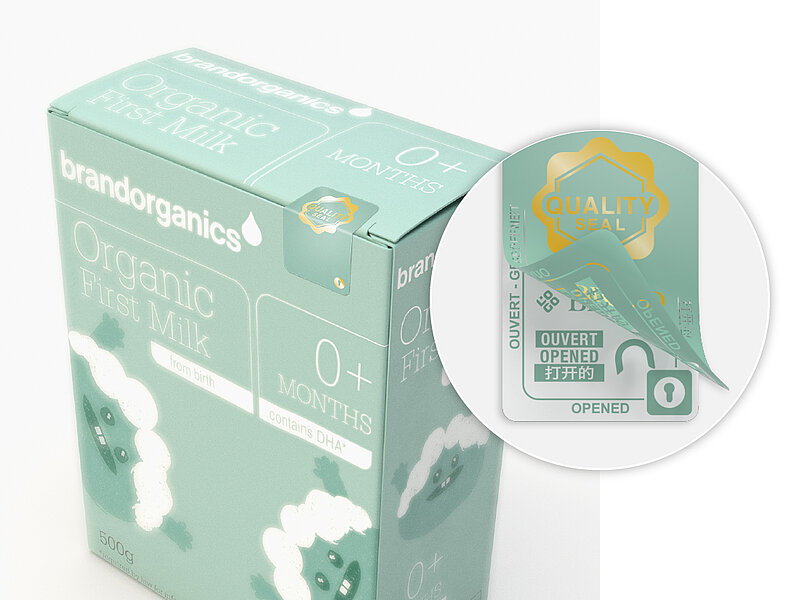
Security labels such as VeoMark® or PrioSpot®
These combine visible, semi-visible, and hidden features in a single compact label. Parents benefit from an obvious authenticity marker, while inspectors and partners can access covert security layers for additional control. Labels can be adapted for a variety of packaging types, from metal tins to flexible pouches.
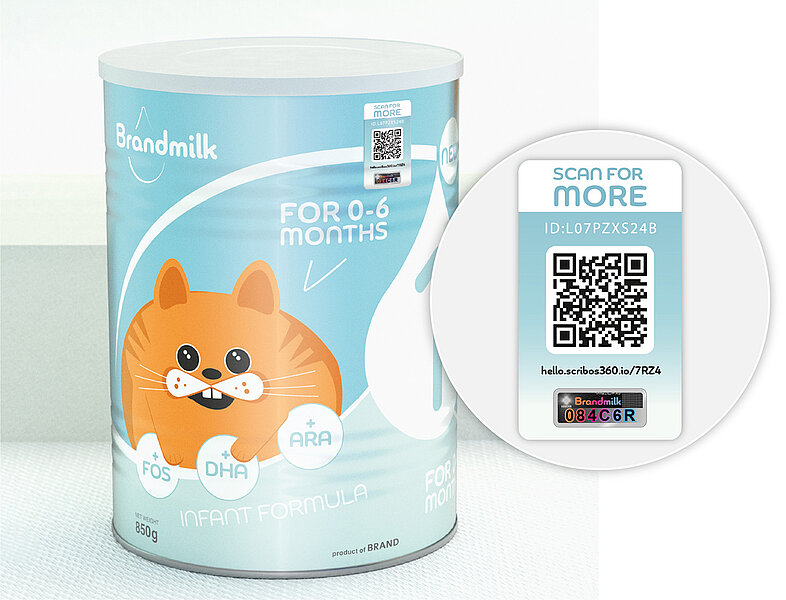

ValiGate® Direct Print
For high-volume infant nutrition products, efficiency and scalability are essential. ValiGate® Direct Print integrates security features directly into the product packaging at the print shop stage. Each pack carries a unique encrypted QR code combined with a patented security pattern, which parents can authenticate with a simple smartphone scan — no app required. By eliminating additional materials, this solution is fast to implement, cost-efficient, and sustainable.
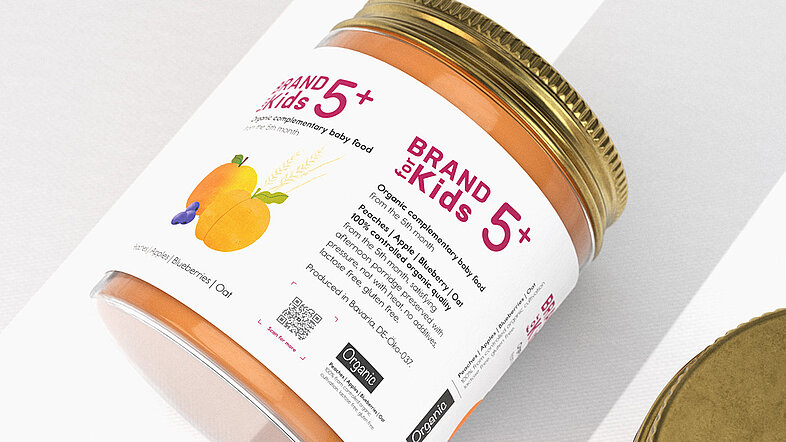
SCRIBOS 360 digital platform
SCRIBOS 360 connects all security solutions and transforms every scan into actionable insights. Parents, partners, and inspectors can instantly authenticate products via smartphone, while brands gain real-time visibility into suspicious activities, product flows, and grey-market patterns.
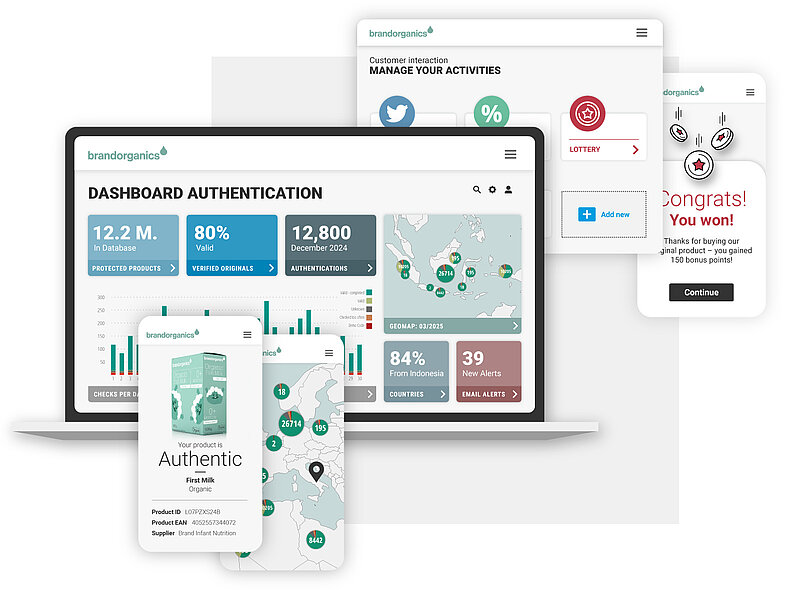
In the infant nutrition sector, the Customer Interaction module plays a particularly vital role. After each scan, parents not only receive immediate proof of authenticity but also access to reliable health and nutrition information directly from the brand. This can include guidance on safe preparation, detailed ingredient information, allergy warnings, and age-appropriate serving recommendations. Such transparent communication not only builds trust but also provides parents with a clear, verifiable assurance that the product is genuine and safe, which is a critical factor when it comes to newborn nutrition.
In addition, the module enables secure two-way interaction: parents can submit questions, report suspicious products, and actively contribute to product safety. For brands, this creates not only closer consumer engagement but also valuable data streams that highlight emerging risks and allow for timely, targeted responses. This is why the SCRIBOS 360 anti-counterfeiting and customer engagement system is especially powerful in protecting infant nutrition products.
Conclusion
Counterfeit infant nutrition continues to threaten children’s health, undermine brand trust, and destabilize markets. Fake products put lives at risk and erode consumer confidence. Choosing high-quality solutions and taking decisive action against counterfeiting is therefore essential for protecting families and ensuring market stability.
The KURZ SCRIBOS brand is committed to supporting infant nutrition manufacturers with innovative solutions that secure products, strengthen supply chains, and build consumer confidence. By combining advanced physical anti-counterfeiting features with powerful digital tools, like the SCRIBOS 360 anti-counterfeiting and customer engagement system, KURZ SCRIBOS helps brands ensure authenticity, gain valuable market insights, and fight counterfeit products effectively.
Remember: milk powder is not just milk powder. The quality of infant nutrition determines health, development, and trust. By choosing quality and leveraging KURZ SCRIBOS solutions, brands can safeguard their products, protect families, and contribute to safer markets worldwide.



